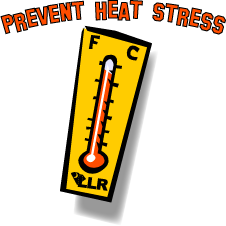Title Page
-
Safety Team Leader Name
-
Rig Number
-
Conducted on
-
we should all be aware of some tips to prevent heat stress. Remember physical activity at high temperatures can directly affect health and indirectly be the cause of accidents. What Is Heat Stress? It's a signal that says the body is having difficulty maintaining it's narrow temperature range. The heart pumps faster, blood is diverted from internal organs to the skin, breathing rate increases, sweating increases, all in an attempt to transfer more heat to the outside air and cool the skin by evaporation of sweat. If the body can't keep up then the person suffers effects ranging from heat cramps to heat exhaustion, and finally to heat stroke. Beat the heat. Help prevent the ill effects of heat stress by: · Drinking water frequently and moderately (every 15-30 minutes). · Resting frequently. · Eating lightly. · Doing more strenuous jobs during the cooler morning hours. · Utilizing the ventilation or fans in enclosed areas. · Remembering that it takes time for the body to adjust to the heat; this adaptation to heat is quickly lost—so your body will need time to adjust after days off. · Avoiding alcohol consumption. Many cases of heat stroke have occurred the day after a "night on the town." · Wearing light colored, cotton clothes and keeping your shirt on—desert nomads don't wear all those clothes for nothing.
-
Add signature
-
Add signature
-
Add signature
-
Add signature
-
Add signature
-
Add signature











